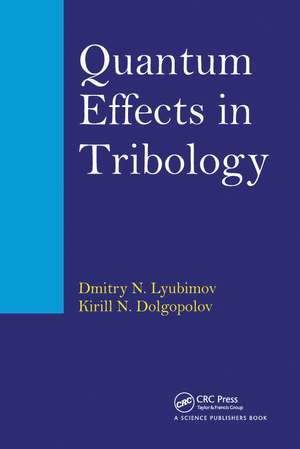Quantum Effects in Tribology
Autor Dmitry Nikolaevich Lyubimov, Kirill Nikolaevich Dolgopoloven Limba Engleză Paperback – 31 mar 2021
The book is intended for professionals working in the field of tribology, but will be also useful for graduate students specializing in the theory of friction and quantum physics.
Preț: 311.30 lei
Preț vechi: 363.66 lei
-14% Nou
Puncte Express: 467
Preț estimativ în valută:
59.57€ • 62.36$ • 49.29£
59.57€ • 62.36$ • 49.29£
Carte tipărită la comandă
Livrare economică 05-19 aprilie
Preluare comenzi: 021 569.72.76
Specificații
ISBN-13: 9780367782405
ISBN-10: 0367782405
Pagini: 196
Dimensiuni: 156 x 234 mm
Greutate: 0.4 kg
Ediția:1
Editura: CRC Press
Colecția CRC Press
Locul publicării:Boca Raton, United States
ISBN-10: 0367782405
Pagini: 196
Dimensiuni: 156 x 234 mm
Greutate: 0.4 kg
Ediția:1
Editura: CRC Press
Colecția CRC Press
Locul publicării:Boca Raton, United States
Cuprins
Preface. Problems of Creation of the Generalized Physical Model of Friction and Wear. Quantum Algorithm for Solving the "Fundamental Paradox of Tribology". Quantum Spaces of Tribosystems. Quantum Dynamics of Tribosystems. Quantum States of Manifested Tribosystem. Afterword. Bibliography.
Notă biografică
Dmitry Nikolaevich Lyubimov, Kirill Nikolaevich Dolgopolov
Descriere
The book provides a new approach to the description of friction processes. It explains the simultaneous coexistence of alternative friction models, and prognosticates the possibility of quantum and relativistic effects manifestation in macromechanical systems such as friction units. Consideration of measurement as a process of defining the outpu
